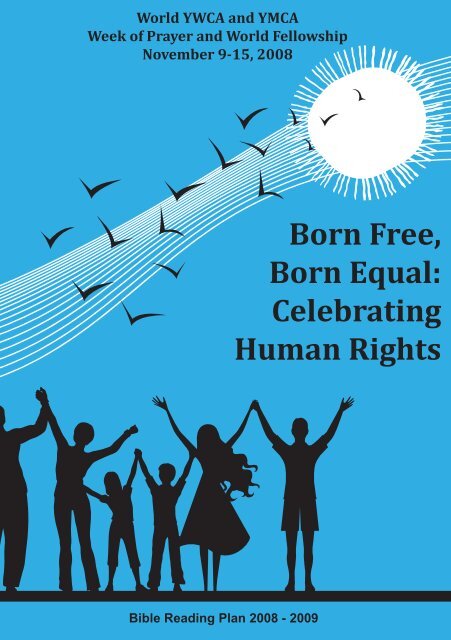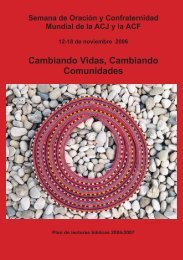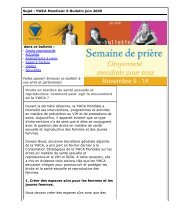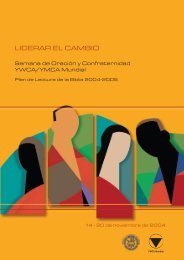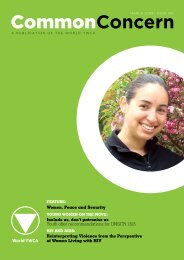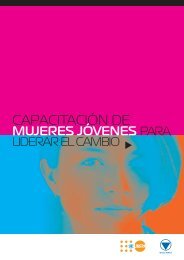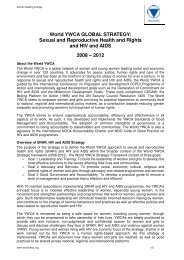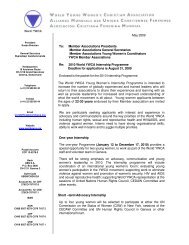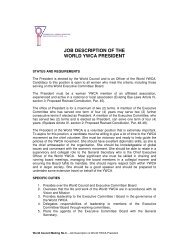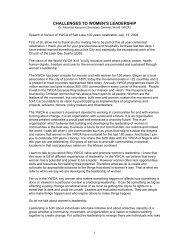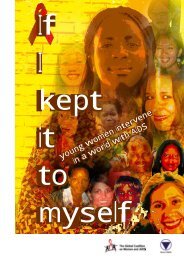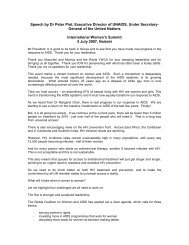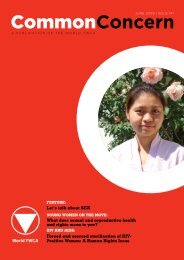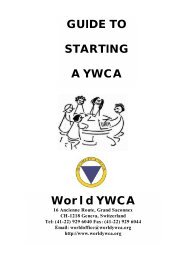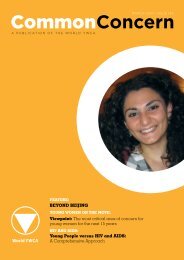Born Free, Born Equal: Celebrating Human Rights - World YWCA
Born Free, Born Equal: Celebrating Human Rights - World YWCA
Born Free, Born Equal: Celebrating Human Rights - World YWCA
- No tags were found...
You also want an ePaper? Increase the reach of your titles
YUMPU automatically turns print PDFs into web optimized ePapers that Google loves.
<strong>World</strong> <strong>YWCA</strong> and YMCAWeek of Prayer and <strong>World</strong> FellowshipNovember 9-15, 2008<strong>Born</strong> <strong>Free</strong>,<strong>Born</strong> <strong>Equal</strong>:<strong>Celebrating</strong><strong>Human</strong> <strong>Rights</strong>Bible Reading Plan 2008 - 2009
CONTENTSPresidents’ Message …………………………………………………... 4Day 1: Why engage in <strong>Human</strong> <strong>Rights</strong> work? ……………………… 6Day 2: Women’s <strong>Rights</strong> are <strong>Human</strong> <strong>Rights</strong> ………………………... 9Day 3: HIV and AIDS and the right to quality life …………………. 12Day 4: Right to decent work ………………………………………….. 15Day 5: Peace with Justice ……………………………………………. 18Day 6: A biblical foundation for climate change action …………. 21Order of Worship: <strong>Celebrating</strong> <strong>Human</strong> <strong>Rights</strong> ……………………. 25<strong>Human</strong> <strong>Rights</strong> Resources …………………………………………….. 28Bible reading plan 2008- 2009 ……………………………………… 312
PRESIDENTS’ MESSAGEDear sisters and brothers,On December 10, 2008 the world will celebrate 60 years of the UniversalDeclaration of <strong>Human</strong> <strong>Rights</strong>. The international community adopted thisDeclaration in 1948 in order to protect human dignity and to preventdiscrimination and oppression.<strong>Human</strong> rights are universal and all the major religions advocate for them.Throughout history, all societies have practiced some kind of discriminationand assigned different degrees of rights, or lack thereof, to different groupsof people. Discrimination can take the form of US versus THEM. Thisdiscrimination may include male versus female, old versus young, richversus poor, differences of class, caste, race, ethnicity and otherdistinctions that diminish human dignity and personhood.The Scriptures show a commitment to protect freedom and justice throughlaw. <strong>Free</strong>dom and dignity given by God are to be ensured by law, asdemonstrated in the Exodus story where Yahweh liberated the people ofIsrael from the bondage of slavery in Egypt and on the way to the PromisedLand gave them the Law. Protecting the rights of foreigners, widows andorphans was especially emphasised. The specific and unique contributionof Jesus, the Christ, was his categorical rejection of any and all of the limitsplaced by human societies on human dignity, and any and all basis fordiscrimination between human beings.Founded on Christian faith the <strong>World</strong> <strong>YWCA</strong> and the <strong>World</strong> Alliance ofYMCAs believe that every human being is created in the image of God andthat God loves every human being without condition. Thus, the dignity ofevery human being is a gift from God.We should not forget that through Henry Dunant, a founding member of theYMCA, our Movements contributed to the early formulation of the GenevaConvention, embodying the principles of respect, dignity and care for allpersons without discrimination. Speaking of his work with the YMCA,Dunant said: “I was taking care of the wounded in times of peace longbefore taking care of the wounded in times of war.”3
Working to promote human rights implies reaching out and loving ourneighbour, but also serving our neighbour. This requires us to not onlyserve those in need, but also to look for the root causes of the suffering, tolook for the different structures that produce injustice and to work actively toovercome those structures.We yearn for a fully inclusive world where justice, peace, health, humandignity, freedom and care for the environment are promoted and sustained,especially through the involvement of young people, to ensure the Christianideal of building a human community of justice with love, peace andreconciliation for the fullness of life for all creation is shared.We hope that this booklet for the Joint Week of Prayer 2008 will help topromote human rights as part of our witness in the world.Martin MeissnerPresident<strong>World</strong> Alliance of YMCAsSusan BrennanPresident<strong>World</strong> <strong>YWCA</strong>4
Everyone is entitled to all the rights and freedoms set forth in this Declaration,without distinction of any kind, such as race, colour, sex, language, religion, politicalor other opinion, national or social origin, property, birth or other status…(Universal Declaration of <strong>Human</strong> <strong>Rights</strong> – Article 2.1)DAY 1: WHY ENGAGE IN HUMAN RIGHTSWORK?Bible reading: Genesis 1“So God Created humankind in his image, in the image of God hecreated them, male and female he created them.” Genesis 1:27Many twentieth-century developments in the area of human rights,including the Universal Declaration of <strong>Human</strong> <strong>Rights</strong>, have been stronglyinfluenced if not inspired by Christians. But we must be cautious of movingtoo directly from biblical and earlier Christian perspectives to current humanrights understandings, especially in today’s multi-religious and secularworld. <strong>Human</strong> rights have developed through complex interacting historicalprocesses informed by experiences of oppression and totalitarianism,injustice and violation of human rights. Yet, human rights can be seen asrooted in, and as the modern political fruits of, ancient religious beliefs andpractices.Although human rights generally are consistent with biblical perspectivesand priorities, they are not ‘owned’ by Christians. Indeed there has been anambiguous historical record with regards to churches and human rights,such as using selected passages of Scripture to deny equal human rightsto women or to justify the use of violence. At times, churches have beenopposed to rather than promoters of basic human rights. Thus, soberinghumility and ongoing critique are required; religious traditions may need tobe critiqued from human rights perspectives, and some (e.g. individualistic)human rights interpretations or applications may need to be critiqued fromreligious perspectives.In creation, God gives all human beings a dignity (created in the image ofGod, Genesis 1:27). This is at the heart of what motivates human rightswork. <strong>Human</strong> dignity is first and foremost in relation to God. This basicdignity must be vigorously defended and upheld in the face of all those5
forces that would compromise, violate or deny who human beings are. Thisdignity is multifaceted: It has to do with the basic spiritual as well asphysical and social needs. It includes the “bread” needed to sustain life onearth, the “bread” that is the right of everyone in community with others,and the “bread” of heaven. What it means to be human transcends narrowlegalistic or reductionistic ways of viewing human beings and their rights,and can be enriched with perspectives of various religious traditions. Thus,political, civil, economic, social, cultural and religious rights must be upheld.Justice and compassion are central to what God is about, and to what weare called to pursue. Justice is grounded in the righteousness of God, whodelivers the oppressed from bondage (Exodus 20:2). Seeking justiceimplies looking out for the rights of all people, and compassion impliesprotecting and caring for those who lack rights. The two dimensions gotogether. The repeated call in Scripture to care for “strangers, widows andorphans” – to reach out in compassion that reflects God’s love –necessarily involves laws that seek to ensure their just treatment. InHebrew Scripture this is based not on the “rights” of individuals but in theobligations and duties of the community. Because order-restoring laws canthemselves become oppressive, justice must continuously be infused withthe heart of compassion (Isaiah 10:1-2).When some live in poverty, or lack basic freedoms, this is an assault on thejust order God intends. God is just and human beings are to be God’sagents of justice in the world. A just and compassionate human order inwhich human flourishing can occur is constructed from the bottom up, asHannah proclaimed, “God raises up the poor from the dust… the needyfrom the ash heap… to make them sit with princes and inherit a seat ofhonour (1 Samuel 2:8a). Dignity, equality and participation are key markersfor human rights. Priority must be given to those most oppressed,excluded, discriminated against, or lacking of opportunities. This wasunderlined in how Jesus proclaimed and embodied the new reign of God(Luke 4:18-19).In the end, therefore, what Christian faith can provide rights-baseddevelopment work is an empowering sense of being able to imagine andlive in the hope of a world different from the current realities of suffering,oppression and violence – i.e., “another world is possible!” – and to worktirelessly with others toward that goal.6
Acknowledgement: Excerpts from Karen L. Bloomquist, “Thinking itover…”, Issue # 16, June 2007, The Lutheran <strong>World</strong> Federation, Geneva,Switzerland. Used with permission.For Group DiscussionHow is culture used to hinder the full respect of human rights in yourcommunity?What practical responses do your <strong>YWCA</strong> or YMCA present or might plan inthe face of this reality?PrayerGod of Life, of Mercy and Justice, help us to remember that peace andjustice must always go hand in hand; one does not exist without the other.Amen.7
All are equal before the law and are entitled without any discrimination toequal protection of the law. All are entitled to equal protection against anydiscrimination in violation of this Declaration and against any incitement tosuch discrimination.(Universal Declaration of <strong>Human</strong> <strong>Rights</strong> – Article 7)DAY 2: WOMEN’S RIGHTS ARE HUMAN RIGHTSReading: Luke 24:1-12“Now it was Mary Magdalene, Joanna, Mary the mother of James, andthe other women with them who told this to the apostles.” Luke 24:10What do we know about the women by the cross and at the resurrection ofJesus?Only Luke speaks about the multitude of women at Easter; the womendisciples followed Jesus from Galilee and escorted him in his final journeyto Jerusalem to celebrate Passover. During the passion, the women ‘stoodat a distance’ (Luke 23:49) because of the barricade of Roman soldiers thatprevented them from coming closer to Jesus; but Peter followed Jesus fromafar to conceal that he knew him. The women were present from thebeginning to the end—demonstrating a love for Jesus that makes themfaithful and courageous in spite of the circumstances.The women standing by the cross had been restored by Jesus; he hadgiven them back life (the daughter of Jairus) and the dignity of a daughter(the woman with the flow of blood and the bent over woman). They werenot dead, impure or bent over—they were standing on their feet.Amidst his pain, Jesus had the consolation of the company of women.It is interesting to note that in several passages of the Gospel women neverrestrained themselves when anointing Jesus. They were always generousand poured on him the most expensive perfumes, without holding back(John 12:3; Luke 7:38; John 11:2). It is also interesting to note that therewere men who criticised the behaviour of the women (Simon the Pharisee,Judas Iscariot). In both cases, Jesus rebuked the men and wholly approvedof the loving gesture of the women.8
They anointed him when he was alive and were willing to anoint him nowthat he was dead.Women are able to experience Easter in a different way from men; womenlive Easter each month in their bodies. When they found Jesus’ tombempty, the Galilean women believed that God had resurrected God’s son.Why wouldn’t they believe it when, after all, they had seen Jesusresurrecting a girl (Luke 8:51-56), a boy (Luke 7:11-17), and a man (John11:43)?Immediately they went to see the 11 disciples and the others to announcethe resurrection of the Christ. Luke mentions that the group included MaryMagdalene, Joanna and Mary the mother of James. But how sad! All theirwords seemed “an idle tale” to the men and they did not believe them (Luke24:9-11).Perhaps the 12 disciples never really understood that Jesus was seriouswhen he referred to the equality of all people in his reign. Maybe theythought that Jesus’ conversation with the woman at the well (John 4), hismerciful acts of healing women (Luke 8:46-56), his words rejecting thatfemale anatomy determines one’s ‘fate’ (Luke 11:27-28) and his revelationto the women at the tomb were mere coincidences?The curtain of the Temple was torn in two at the death of Jesus (Luke23:45). There are no more privileged places. The women entered into theNew Alliance, in the same upper room where the apostles live, praying withthem in the same spirit. The Holy Spirit pours on everybody—men andwomen. This is a great contrast with the Old Covenant. It breaks with thediscrimination of women in the Synagogue and in the Temple. In theChurch of Christ there is no more division.We cannot deny that Jesus chose women to be witnesses of hisresurrection. In Matthew’s Gospel (28:9-10) and John’s (20:1-18) we findthe last words of Jesus to the women, which are as his will and farewell:“Woman, why are you weeping…?”“God be with you!”“Do not be afraid…”“Go, and tell my brothers… Go to my brothers and say to them…”9
How wonderful Jesus is with women! He knows them profoundly. On onehand he looks for them, encourages them, loves them, allows them toembrace and kiss him, and on the other hand, he sends them to announceand to be witnesses of his Resurrection.Each time we testify about the transforming power of the Resurrection inour lives, we are following in the steps of our mothers in the faith — MaryMagdalene and the others. They who encounter the Lord of life in therestoration of their bodies and spirits may have proclaimed the Good Newswith such power. Today’s world, as did Mary Magdalene’s, demands thesame type of personal testimony. Jesus affirmed the capacity and the rightof women to give testimony and to preach. Their call to do so comes fromhim.Acknowledgement: Excerpts from Méndez Peñate, Adriana “La BuenaNoticia desde la Mujer - Reflexiones Sobre la Mujer en el Evangelio deLucas", Serie Pastoral 9, Centro de Reflexión Teológica, México, 1989, pp113-118. Used with permission.For Group DiscussionMary Magdalene never denied or abandoned Jesus. In fact, it can be saidthat she was the first person to give the news of Christ’s Resurrection. Whydo you think that she is mainly remembered as the repented sinner whilePeter, who cursed and denied Jesus, is remembered as a great preacher(Mark 14:66-72; John 21:15-19)?How does your YMCA or <strong>YWCA</strong> approach cultural elements that reinforcegender inequality? How can we encourage young people to develop amore Christ like approach to gender roles?PrayerGod, whose mercy knows no end, whose womb stretches wide enough tobring to birth all of life, nurturing each possibility, protecting each hope,forgiving each wrong, gather us into your womb so that we are reborn inyour image, and women around the world are changed by your lovethrough Jesus Christ, our brother.10
Everyone has the right to a standard of living adequate for the health and well‐being ofhim/herself and of their family, including food, clothing, housing and medical care andnecessary social services, and the right to security in the event of unemployment,sickness, disability, widowhood, old age or other lack of livelihood in circumstancesbeyond his control.(Universal Declaration of <strong>Human</strong> <strong>Rights</strong> – Article 25,1)DAY 3: HIV AND AIDS AND THE RIGHT TOQUALITY LIFEReading: Luke 18:1-8“Grant me justice against my opponent.” Luke 18:3People who work in the context of HIV and AIDS know too well this corruptand unfair judgement. We work together to dismantle immense andpowerful structures which unjustly and unfairly keep many people livingwith HIV far from any hope for a high quality of life. Statistics show that ofthe 33 million people who live with HIV, 95% live in so-called developingcountries. Among them, 9.7 million need immediate treatment, which couldoffer quality of life and hope for a future, but these are denied by the globalsystem of patents and trade. Each number is a person made of flesh andbones, with dreams and expectations and, as the widow in the parable,they continue to demand for justice.The powerful pharmaceutical industry uses international treaties andagreements as a basis for their privileges and to guarantee their profits.The most powerful governments in the world are on their side and thepressure they put on widows, orphans and ‘foreigners’ demonstrate theirinjustice. People who live with or are affected by HIV and AIDS know toowell this powerful judge. But our faith assures us and gives us the certaintythat the continued and legitimate demand for justice and quality of life hasto be sustained and we must never give up. All the possible alliances thatguarantee universal access to quality and affordable treatment by 2010have to be developed, following the commitment of governments aroundthe world. Our faith in God’s project confirms to us every day that in spite of11
all our failures, justice will prevail and truth and mercy will embrace eachother in the world we are building in God.We do not want to accept to be daily witnesses of unnecessary sufferingand death due to lack of access to treatment for groups and individualsmade vulnerable by economic systems and lack of solidarity and justice.That is why we join all widows and orphans, migrants and foreignersaffected by HIV and AIDS who are denied essential medicine to assuretheir lives in the one and permanent cry JUSTICE! ACCESS NOW! KEEPTHE PROMISE OF ASSURING ACCESS TO ESSENTIAL MEDICINE! Wemake ourselves one in Christ Jesus with all the vulnerable people andgroups in their basic and essential right to life and quality of life.God is speaking in the silence of many voices that no longer have thestrength to claim for their rights. God is speaking in the eyes of so manypeople who live with HIV and look at us accusingly from their sickbeds,from their discontinued work projects, from their loneliness. God is notsilent, on the contrary, God is shouting to us through each person who liveswith HIV who does not have access to essential medicine to guarantee thequality of his or her life, as the Gospel promises to all of us. God alsospeaks to us through people living with HIV – those who have access tomedications and are living healthy and productive lives as an example ofwhat could be and the hope that exists in abundant life. In contemplationand in prayer we have to listen, see and act starting from that silent cry ofGod. Only true contemplatives can listen to this cry and feel thisparadoxical and mysterious presence of the God of justice in the claims,actions and expectations of all the people who are denied access to themiracle of essential medicine that could change their history and their life.In the face of so much injustice done in the name of the intellectual rights ofthe powerful pharmaceutical industry, God is revealed to us—not only as ajust and equitable God, but also as the judge who takes the side of theweak, stigmatised and marginalised. We know and we confess that God iswith those trapped in structural weaknesses and social injustices. God’sjustice openly sides with and joins its voice with the cry of God’s peoplewho live with HIV, for their right to dignity and a future.Acknowledgement: Excerpts from Orlov, Lisandro, Meditación sobre elEvangelio del Domingo 21 de Octubre de 2007, Pastoral Ecuménica VIH-SIDA, Buenos Aires – Argentina, Octubre 2007. Used with permission.12
For Group DiscussionThe widow represents all the vulnerable people that in spite of theirsmallness and defencelessness find strength in their faith to defend theirrights: the rights of people living with HIV who are stigmatised and of all thepoor who await for justice and respect of their God-given rights. How couldthis parable be read in this sense, in this time of HIV and AIDS and of claimfor universal access to the essential medicine?PrayerIt’s time, Lord, for those who are sick to have medicine so they don’t dieunnecessarily. Its time, Lord, for churches to open their doors to all people.Its time, Lord, to tear away the burden of prejudice and self righteousnesspride. Its time, Lord, to hear the cries of the children without mother orfather. Its time, Lord.<strong>Born</strong> free, born equal: The story of Kousalya Periasamy, IndiaAt 21 years old, Kousalya was forced to marry her cousin. Less than a yearinto her marriage, her husband died and she discovered that she was HIVpositive. It was 1995 and HIV and AIDS was little understood and greatlyfeared in India at the time. Young and widowed, she was ostracised bysome of her relatives. But Kousalya did not let her youth or status in societydictate her fate. When her relatives threatened to take away her propertyshe fought back in court. As the case proceeded in court, it became clearthat she would have to disclose her HIV status; but determined for justice,she bravely revealed her status and became one of the first women in Indiato speak publicly about living with HIV. Showing great courage anddetermination Kousalya worked to raise the profile of HIV positive womenin India and eventually around the world. She established the first networkfor positive women in India that now reaches more than 5,000 women. Thenetwork advocates for gender responsive government programmes andservices and works to end stigma and discrimination against women livingwith HIV.Kousalya received the <strong>World</strong> <strong>YWCA</strong> Women Leading Change Award in2007 for her work in addressing stigma and discrimination. Women livingwith HIV are important partners in the response to HIV and AIDS.Collaboration between community women, governments, pharmaceuticals,civil society, intergovernmental agencies and corporate sector is necessaryif we are to make universal access to HIV treatment, care and prevention areality.13
(1) Everyone has the right to work, to free choice of employment, to just andfavourable conditions of work and to protection again st unemployment.(2) Everyone, without any discrimination, has the right to equal pay forequal work.(3) Everyone who works has the right to just and favourable remunerationensuring for him/herself and their family an existence worthy of humandignity, and supplemented, if necessary, by other means of socialprotection.(Universal Declaration of <strong>Human</strong> <strong>Rights</strong> – Article 23)DAY 4: RIGHT TO DECENT WORKReading: Matthew 20:1-16“So the last will be the first, and the first will be the last.” Matthew20:16This is a story about a landowner, even though it’s called the parable of thelabourers. And the landowner, of course, is God. The problem with us inGod’s eyes is that we grumble a lot. We’re ungrateful for what we’re aboutto receive, and when people alongside us receive more than they deservethen we huff and puff even more, full of our own self-righteousness.But God doesn’t work by our rules. God’s grace isn’t contained by our ideasof deserving or earning. God is not bound by fair trade agreements or unioncontracts. God’s judgments aren’t subject to the employment court. God’sgrace is distributed with a generosity beyond our understanding.[In this parable], Jesus is talking about real people in the real world. Hehimself came from the peasant class so he knew what it was like to live onthe brink of poverty, in a country run by an occupying army and their clientgovernors who milked the population for every coin and every crop theycould secure. And he knew only too well what the life of a day labourer waslike. Day labourers were men who had fallen off the cliff of society. Whenthey couldn’t find casual work, they had to beg on the streets, or join anoutlaw gang. Once they entered this class, their life expectancy dropped14
very drastically. The denarius they were paid for a day’s labour was meantto sustain them for a day, but the work was spasmodic, limited to plantingand harvest time. For most of the year they starved.We know from the rest of his teaching that Jesus has highly biased andsympathetic views towards the poorest of the poor. They shall inherit thekingdom of heaven. The last shall be the first. Blessed are those who haveleast. If this parable is at all consistent with the rest of the gospels then ithas to be at least as much about the workers as it is about the landowner.So what is it saying about them? They argue a lot, they are dividedbetween themselves, which is exactly how the landowner likes them to be,because that way he can pick and choose them as it suits and arrange theirpayment as his mood takes him. And that kind of division is disastrous.When the poorest in our society are divided and set against each otherthen their tragedy is multiplied a hundred times.This is a parable that calls for a change of heart from rich and poor alike. Itjudges both groups and holds them to account, for both groups are capableof envy and selfishness, complacency and arrogance. But the parable hasmore to say. The poorest of the poor would have been encouraged by thisstory and its call to act together, for they knew it came from a man whosemother sang of a God who puts down the mighty from their seat and exaltsthe humble and meek; a man who opened his ministry with Isaiah’spromise to bring good news to the poor.To the privileged Jews of the day who relied on the Roman invaders toprotect their exploitation of their own people, this would have been asubversive parable indeed. Not only for its criticism of economic systemsthat lock an underclass into poverty to balance the comfort of the rest, butalso for its outrageous claim that everything we enjoy is a gift from God.We don’t have the right to own anything –land, money, jobs- in any finalsense. We are simply custodians, stewards of God’s bounty, accountableto each other for each other’s wellbeing, and expected to ensure there isenough for all.That wasn’t a popular message then. The day labourers had troublehearing it. The landowners heard it and hated it. And it helped to hurryJesus towards his death on the cross. It’s not a popular message now, asthe gap between the haves and the haves-nots grows ever greater. Thebest place to start in addressing this crisis of a country out of kilter and a15
world out of balance is with Paul’s questions, “What do you have that youhaven’t received?” Only when we start to see the world with such gratefuleyes can we dare to take seriously what these words of Jesus might mean:“ the last will be first and the first last.”Acknowledgement: Excerpts from What About the Workers in “TheGiveaway God - Ecumenical Bible Studies on Divine Generosity” by Bluck,John; Risk book series, WCC Publications, Geneva, 2001. Used withpermission.For Group DiscussionIn this world were more and more employees are made redundant, andmany people do not have access to decent jobs, how does your <strong>YWCA</strong> orYMCA respond?PrayerGod of justice beyond our understanding, give us courage and wisdom todenounce the unjust structures which deny people the dignity of earningtheir daily living and help us to be in solidarity with those of us who havedropped out from the nets of the system.16
Everyone is entitled to a social and international order in which the rights andfreedoms set forth in this Declaration can be fully realised.(Universal Declaration of <strong>Human</strong> <strong>Rights</strong>: Article 28)DAY 5: PEACE WITH JUSTICEReading: Exodus 3: 1-12“I have heard the cry of my people”… Exodus 3:7For Christians committed to the renewal of the life of the earth, the biblicalunderstanding of justice and peace is not simply a reference point foranalysing the past; it constitutes the model and the means by which a newfuture can be created. [Some] church[es] understands the Scripture, not asa manual for problem solving nor as a rule book for ethical behaviour,rather it understands Scripture as the inspired account of the real hardshipsof people struggling to find release from bondage, oppression, andhopelessness through faith in a righteous God able to set right that which iswrong and restore that which is broken. This happens through graciousacts of deliverance or salvation within the conditions of historical existence.For [some] church[es] today the dynamic understanding of justice andpeace must therefore begin where the Scripture itself begins—namely byidentifying with a people who have been subjected to real poverty, realexploitation, real inequity, real violence, real oppression. Only then can wedetermine whether the power of God to deliver is itself real—that it is ableto transform the material and spiritual conditions under which people livetoday.It is only because we are aware of the whole scope of the biblical tradition,with its centre in the universal message and ministry of Jesus Christ, thatwe are able to understand the deeper meaning of the ‘cries of my people’.In the Old Testament, the question of justice arises when the cry ofsuffering or rage is raised against some form of bondage or oppression. Itis a desperate cry for action, a plea to the sovereign Creator to dosomething, to act, to move to restore wholeness to a community, to deliver17
from physical bondage, to set right that which was broken, to vindicate poorpeople who have been cheated and robbed.It is only when the institutions of a society prove completely incapable ofbeing reformed in the image of God’s justice that a more sweepingjudgment is called for. It is at this point that God moves on behalf of theoppressed, not to reform that system, but to destroy and replace it withanother.In the Old Testament justice receives its definition through God’s graciousact to deliver the people of Israel from the concrete historical situation ofservitude in Egypt. It is this saving act, rather than common ancestry ornationality that forms the basis of the covenant agreement between Godand the people.“You have seen what I did to the Egyptians, and how I bore you on eagleswings and brought you to myself. Now therefore, if you will obey my voiceand keep my covenant, you shall be my possession among all peoples.”(Exodus 19:4,5)God promises faithfulness and mercy (hesed in Hebrew); the peoplepromise to keep the covenant by following the laws which governrelationships of justice within community.Justice leads to peace. When injustice has been overcome and socialrelationship have been restored, when members of the community heedGod’s call “To share one’s food with the hungry and shelter the homelesspoor” (Isaiah 58:6f) only then will there be real peace (shalom).“then shalom will become reality: Love and faithfulness meet, justice andpeace embrace.” (Psalms 85:10f)It is evident from this that the biblical understanding of justice does notmean “law and order” or “giving everyone his/her due”; peace does notmean the absence of war or the quiet acceptance of the status quo. In theScripture both justice and peace, taken together, are understood as theharmonious inter-relationship of all things under the sovereignty of the oneGod of nature and history.As we study and analyse the words and deeds of Jesus in Matthew 5-9, wehave the key to a fresh reading of the Old Testament and to a discovery ofthe true meaning of the phrase, “I have heard the cry of my people”18
(Exodus. 3:7). The cry of the poor went up and reached the ears of God(Exodus. 2:23). God heard their groaning and he remembered his covenantwith their fathers.Through his words and deeds Jesus showed how to be like the God whohears the cry of the poor. Jesus went about listening to the cry of thepeople of his time, particularly the cry of the most marginalised people. Helistened to the silent cry of the voiceless poor. As he answered their cry,Jesus retrieved the true liberating image of God, while simultaneouslyquestioning the prevailing knowledge of this God. Through the words anddeeds of Jesus people opened their eyes and recognised in him that oldand yet ever fresh presence of Yahweh. They saw in Jesus the prophetwho was to come, the SERVANT who would liberate the people. Thus, theyinterpreted the Old in the light of the New.Acknowledgement: Excerpts from “I have Heard the Cry of My People…For Peace with Justice” and from Bible Studies prepared by an ecumenicalgroup in Brazil led by Pastor Milton Schwantes and Father Carlos Mesters.Translated from Portuguese. Additional study material, notes for BibleStudy, the Lutheran <strong>World</strong> Federation Eighth Assembly, Curitiba, Brazil,January 30 – February 8, 1990. Used with permission.For Group DiscussionWhat is the cry of our people today? Where is justice and peace mostlacking? What role can YMCAs and <strong>YWCA</strong>s play in helping the oppressedin our community? What role can young people play in ensuring lastingpeace with justice?PrayerGod of peace and justice, let peace become a reality in our communities,nations and in the world today. Inspire us and guide our actions so that wemight respond to the groaning of your people with love and faithfulness.19
All human beings are born free and equal in dignity and rights. They areendowed with reason and conscience and should act towards one another in aspirit of brotherhood.(Universal Declaration of <strong>Human</strong> <strong>Rights</strong> – Article 1)DAY 6: A BIBLICAL FOUNDATION FOR CLIMATECHANGE ACTIONReading: Genesis 1: 27-31“God saw everything that he had made, and indeed, it was verygood.” Genesis 1:31Was it Al Gore’s film? Was it the drought? Whatever the catalyst, climatechange is now headline news every day. Is it just a distraction from our truemission, or is it an integral part of our Kingdom mandate?Creation is a demonstration of the glory of God, to be cared for andnurtured. It eagerly awaits its own renewal when Christ returns.Furthermore, to love our neighbours, as Jesus commanded, surely impliesthat we share the world’s resources with others, both present and future.Environmentalism, therefore, goes to the heart of God’s demand for justice.God reveals himself throughout the Bible as a God who “defends the causeof the fatherless and widow.” On the verge of entering the Promised Land,the people were told: “There will always be poor people in the land.Therefore I command you to be open-handed … towards the poor andneedy in your land” (Deuteronomy 15:11). Sharing the world’s resources toalleviate poverty is no optional extra, but a fundamental outworking ofGod’s character.Sadly, the impact of environmental degradation falls most heavily on thepoor. Living in the most vulnerable places, farming the least fertile land,occupying the most polluted land, it is the poor who suffer, often forcedthrough their poverty to further degrade the land on which they live.20
Since environmental degradation is largely the product of industrial society,the Bible does not explicitly address it. However, there are severalelements in the Levitical law that highlight God’s intention that his peopledemonstrate justice by sharing, caring for and preserving naturalresources.The Sabbatical year (Leviticus 25:1-7) allowed the land itself to be restedevery 7th year, rather than ruthlessly exploited for short-term gain. TheYear of Jubilee (Leviticus 25:8-55) takes this principle much further. The50th year redistribution of land demonstrates that property ownership is notabsolute; merely a temporary stewardship of what belongs to God. Naturalresources must therefore be managed in such a way that they remainavailable and useful to future “stewards”.God’s justice demands that the poor and most vulnerable be cared for; thatthe world’s resources are shared among all people, of this and futuregenerations, and that we act to prevent environmental damage from furtheroppressing those already suffering under heavy burdens of poverty andmarginalisation.Climate change is the major environmental issue of our day. It threatensthe lives of millions of the world’s poorest and most vulnerable people.They will suffer lower economic growth, direct impacts on their livelihoodsand assets, decreased food and water security, increased incidence ofdiseases such as malaria and tuberculosis, and increased risk of disasters.Those of us in wealthy nations, through our continued consumption ofelectricity produced by fossil fuels, our polluting transportation, ourcontinued land clearing and meat consumption, are causing this problem.As consumers, proprietors and employees, we are among thebeneficiaries.As God’s people, we are called to live the values of God’s Kingdom hereand now. This involves loving our neighbours, demonstrating justice for thepoor, and working for the renewal and healing of creation. <strong>Human</strong>-inducedclimate change represents degradation of creation and a gross injusticeagainst the world’s poor. Climate change is therefore our responsibility, andtackling it is part of our God given mission.What has climate change got to do with Christians? Everything! It is ourproblem and we are called to be part of the solution. We must examine our21
own lives as well as speaking up on behalf of those most affected, but withthe least voice. As Isaiah urged his people, so his words challenge us toaction: Learn to do right! Seek justice, encourage the oppressed. Defendthe cause of the fatherless, plead the case of the widow (Isaiah 1:17).Acknowledgement: Excerpts from "A Biblical Foundation for ClimateChange Action” by Mc. Kinnon, John. This article originally appeared inTEAR Australia's Target Magazine in August 2007. Used with permission.For Group DiscussionList some of the things that stop us living as if the Earth really does belongto God. How can your <strong>YWCA</strong> or YMCA help people to act in order to stopthis happening? How can young people work towards sustainabledevelopment?PrayerGod of creation, you sang the world into being. You breathed and we werecreated. Even the rocks sing your name. Help us to be grateful for yourcreation and to act responsibly knowing that we are called to be caretakersof this world which was lent to us.YMCA People Drive Environmental ChangeAs associations working at local level, YMCAs are ideally placed toinfluence local choices, practices and policies that collectively contribute toenvironmental destruction.Transforming Attitudes in Hong KongFor many years the youth of Hong Kong YMCAs have been dedicatingefforts to challenge and transform the minds and habits of young peopleconcerning environmental issues.One vehicle the young people have used to nurture a healthy attitudetowards the environment is the Grass Roots and Green sproutsnewsletters. The goal is to engage young people in the movement torespect the environment. Every school in hong Kong is on the circulationlist.22
“We are hoping to make a contribution – one person, one family, oneschool and one organisation at a time.” Young YMCA Leaders, HongKong.Advocating for Environmental Sustainability in SeattleThe YMCA Earth Servcies Corps (YESC) programme was developed inSeattle in 1989 by a group of high school students and teachers. YESC is amodel which “empowers young people to become effective, responsibleglobal citizens by providing opportunities for leadership, environmentaleducation, action and cross-cultural awareness”The Bainbridge High School Earth Service Corps Water Quality Project is agood example of the capability of youth leaders to move from direct serviceprojects into advocacy roles. Members of the club first got involved in waterquality issues by researching storm drain patterns on the island. In theprocess club members became local experts on these issues.Club members now regularly attend City Council meetings and have beenappointed to leadership roles on the city wide Watershed Council. Theyhave also written grants to the City, local foundations and received fundsfrom the YMCA to support their efforts to reduce water pollution.YMCA <strong>World</strong>, No. 3, September 200723
ORDER OF WORSHIP: CELEBRATING HUMANRIGHTSCan be used during the Week of Prayer or on <strong>Human</strong> <strong>Rights</strong> Day,December 10Call to Worship (Psalms 67)Leader: May God's face shine upon us, that God's way may be knownupon the earth, the peace of God among all nations.People: Let the peoples pursue your justice and your peace, O God. Let allthe people pursue your peace.Leader: Let the nations be glad and sing for joy, for you judge the peopleswith equity and guide the nations upon the earth.People: Let the people pursue your justice and your peace, O God. Let allthe people pursue your peace.Hymn:Prayer of ConfessionLeader: God of life, Creator of all peopleAs equal in dignity and humanity;You have called us to be one:To live in unity and harmony;To build faith and realize community.Yet we are dividedRace from race; class from class;Rich from poor; gender from gender;Old from young; neighbour from neighbour.People: O God, by whose love all enmity is brought to an end:Break down the walls that separate us,Forgive the sins that divide us,<strong>Free</strong> us from pride and prejudice.O God, give us the courage to repent honestly;Give us the power to change our lives,That we might be dead to sin and alive in Christ. AMENAssurance of PardonLeader: The mercy of God is from everlasting to everlasting.As the dove gently settles on the tree, receive the gift of peace.As the flame rises free with light and warmth, receive the gift of life.24
As the wind moves and dances around the earth,receive the gracious gift of the Spirit.People: Come, O Holy Spirit.Come as Holy Fire and burn in us,Come as Holy Wind and cleanse us,Come as Holy Light and lead us,Come as Holy Life and dwell within us.Convict us, convert us, consecrate us,Until we are set free from the service of ourselves,To be your servants to the world. AMEN.First Reading Isaiah 2:2-5HymnSecond Reading 2 Corinthians 5:16-20SermonLitany of CommitmentExcerpts from the Beatitudes (Luke 6:17-22 and Matthew 5:1-11) and theCharter of the United NationsLeader: God of all creation, we are your children. We are also the peoplesof the United Nations.People: Help us seek the security of the whole human family made in yourimage and for whom Jesus lived, died and lived again.Leader: Jesus said, "Blessed are the peacemakers for they will be calledchildren of God."People: God of Peace, we your children and the peoples of the UnitedNations are "determined to save succeeding generations from the scourgeof war."Leader: Jesus said, "Blessed are those who hunger and thirst forrighteousness' sake, for theirs is the kingdom of heaven."People: God of Love, we your children and the peoples of the UnitedNations "reaffirm faith in fundamental human rights, in the dignity and worthof the human person, and in the equal rights of men and women andnations large and small."Leader: Jesus said, "Blessed are you who are poor, for yours is theKingdom of God."25
People: God of Life, we your children and the peoples of the UnitedNations will "promote social progress and better standards of life in largerfreedom."Leader: Jesus said, "love your neighbour as yourself and love yourenemies, do good and lend, expecting nothing in return."People: God of Community, we your children and the peoples of the UnitedNations will "practice tolerance and live together in peace as goodneighbours." We are called to be peacemakers to the Christ who came thatwe might know a peace that passes understanding. Lead us to rise up andbe called children of God, citizens of a new world community. Guide us tospeak boldly, with moral conviction, to the nations and to the world. Let usbuild, with your grace, a global community by acting now for world peace,for a flowering of justice, for an opportunity of love, for the realization ofYour peace. AMEN.HymnCharge and BenedictionLeader: "God was in Christ reconciling the world unto God's self andentrusting to us the message of reconciliation." Christ charges us topractice God's shalom and seek life in all its fullness for all God's people,everywhere.People: And the courage of Christ, the peace of God and the inspiration ofthe Holy Spirit will be always with us. AMEN.Acknowledgement: The Order of Worship was created by thePresbyterian United Nations Office, a ministry of the Presbyterian Church(U.S.A.) www.pcusa.org/peacemaking. Used with permission26
HUMAN RIGHTS RESOURCESAbout the Universal Declaration of <strong>Human</strong> <strong>Rights</strong>The Universal Declaration of <strong>Human</strong> <strong>Rights</strong> was adopted and proclaimedby the General Assembly as a common standard of achievement for allpeoples and all nations, to the end that every individual and every organ ofsociety, keeping this Declaration constantly in mind, shall strive by teachingand education to promote respect for these rights and freedoms and byprogressive measures, national and international, to secure their universaland effective recognition and observance, both among, the peoples ofUnited Nations Member States themselves and among the peoples ofterritories under their jurisdiction.The Declaration consists of a preamble and 30 articles, setting forth thehuman rights and fundamental freedoms to which all men and women,everywhere in the world, are entitled, without any discrimination.Article 1, which lays down the philosophy on which the Declaration isbased, reads:All human beings are born free and equal in dignity and rights. They areendowed with reason and conscience and should act towards one anotherin a spirit of brotherhood.The article thus defines the basic assumptions of the Declaration: that theright to liberty and equality is man's birthright and cannot be alienated: andthat, because man is a rational and moral being, he is different from othercreatures on earth and therefore entitled to certain rights and freedomswhich other creatures do not enjoy.Article 2, which sets out the basic principle of equality and nondiscrimination as regards the enjoyment of human rights and fundamentalfreedoms, forbids "distinction of any kind, such as race, colour, sex,language, religion, political or other opinion, national or social origin,property, birth or other status".Article 3, the first cornerstone of the Declaration, proclaims the right to life,liberty and security of person –a right essential to the enjoyment of all otherrights. This article introduces articles 4 to 21, in which other civil andpolitical rights are set out, including:27
• freedom from slavery and servitude;• freedom from torture and cruel, inhuman or degrading treatment orpunishment;• the right to recognition everywhere as a person before the law;• the right to an effective judicial remedy;• freedom from arbitrary arrest, detention or exile;• the right to a fair trial and public hearing by an independent andimpartial tribunal;• the right to be presumed innocent until proved guilty;• freedom from arbitrary interference with privacy, family, home orcorrespondence;• freedom of movement and residence; the right of asylum; the rightto a nationality; the right to marry and to found a family;• the right to own property;• freedom of thought, conscience and religion;• freedom of opinion and expression;• the right to peaceful assembly and association;• and the right to take part in the government of one's country and toequal access to public service in one's country.Article 22, the second cornerstone of the Declaration, introduces articles23 to 27, in which economic, social and cultural rights -the rights to whicheveryone is entitled "as a member of society" -are set out. The articlecharacterises these rights as indispensable for human dignity and the freedevelopment of personality, and indicates that they are to be realized"through national effort and international cooperation". At the same time, itpoints out the limitations of realization, the extent of which depends on theresources of each State.The economic, social and cultural rights recognised in articles 22 to 27include the right to social security; the right to work; the right to equal payfor equal work; the right to rest and leisure; the right to a standard of livingadequate for health and well-being; the right to education; and the right toparticipate in the cultural life of the community.The concluding articles, articles 28 to 30, recognize that everyone isentitled to a social and international order in which the human rights andfundamental freedoms set forth in the Declaration may be fully realized,and stress the duties and responsibilities which each individual owes to hiscommunity. Article 29 states that "in the exercise of his rights andfreedoms, everyone shall be subject only to such imitations as are28
determined by law solely for the purpose of securing due recognition andrespect for the rights and freedoms of others and of meeting the justrequirements of morality, public order and the general welfare in ademocratic society". It adds that in no case may human rights andfundamental freedoms be exercised contrary to the purposes and principlesof the United Nations.Article 30 emphasizes that no State, group or person may claim any right,under the Declaration, "to engage in any activity or to perform any actaimed at the destruction of any of the rights and freedoms set forth" in theDeclaration.From Office of the United Nations High Commissioner for <strong>Human</strong> <strong>Rights</strong>(OHCHR); Fact Sheet No. 2 The International Bill of <strong>Human</strong> <strong>Rights</strong> (Rev.1)WEB RESOURCESRead the <strong>Human</strong> <strong>Rights</strong> Declaration (available in over 300 languages):www.unhchr.ch/udhr/navigate/alpha.htmVisit these websites for reports and statistics on <strong>Human</strong> <strong>Rights</strong> in yourcountry and around the world:Office of the United Nations High Commissioner for <strong>Human</strong> <strong>Rights</strong>(OHCHR): www.ohchr.orgAmnesty International: www.amnesty.org<strong>Human</strong> <strong>Rights</strong> Watch: www.hrw.org29
BIBLE READING PLAN 2008 - 2009November 20081. 2 Cor 8,16-242. Psm 1253. 2 Cor 9,1-54. 2 Cor 9,6-155. 2 Cor 10,1-116. 2 Cor 10,12-187. 2 Cor 11,1-68. 2 Cor 11,7-159. Psm 9010. 2 Cor 11,16-3311. 2 Cor 12,1-1012. 2 Cor 12,11-1813. 2 Cor 12,19-2114. 2 Cor 13,1-415. 2 Cor 13,5-1316. Psm 5117. 2 Pet 1,1-1118. 2 Pet 1,12-2119. 2 Pet 2,1-1120. 2 Pet 2,12-2221. 2 Pet 3,1-922. 2 Pet 3,10-1823. Isa 26,7-1924. Isa 56,1-825. Isa 57,1-1326. Isa 57,14-2127. Isa 58,1-1228. Isa 58,13-1429. Isa 59,1-15a30. Psm 24December 20081. Isa 59,15b-212. Isa 60,1-143. Isa 60,15-224. Isa 61,1-65. Isa 61,7-116. Isa 62,1-57. Psm 68,1-198. Isa 62,6-129. Isa 63,7-1610. Isa 63,17–64,311. Isa 64,4-1112. Isa 65,1-1613. Isa 65,17-2514. Psm 68,20-3615. Isa 66,1-416. Isa 66,5-1717. Isa 66,18-2418. Lk 1,1-1719. Lk 1,18-2520. Lk 1,26-3821. Psm 13022. Lk 1,39-5623. Lk 1,57-6624. Lk 1,67-8025. ChristmasLk 2,1-1426. Lk 2,15-2027. Lk 2,21-2428. Psm 229. Lk 2,25-3530. Lk 2,36-4031. Lk 2,41-52January 20091. New YearPsm 1042. Lk 3,1-63. Lk 3,7-144. Psm 165. Lk 3,15-206. Lk 3,21-387. Lk 4,1-138. Lk 4,14-219. Lk 4,22-3010. Lk 4,31-3711. Psm 7212. Lk 4,38-4413. Lk 5,1-1114. Lk 5,12-1615. Lk 5,17-2616. Lk 5,27-3217. Lk 5,33-3918. Psm 419. Lk 6,1-1120. Lk 6,12-1621. Lk 6,17-2622. Lk 6,27-3523. Lk 6,36-4224. Lk 6,43-4925. Psm 326. Lk 7,1-1027. Lk 7,11-1728. Lk 7,18-2329. Lk 7,24-3530. Lk 7,36-5031. Lk 8,1-330
February 20091. Psm 92. Lk 8,4-153. Lk 8,16-214. Lk 8,22-255. Lk 8,26-396. Lk 8,40-567. Lk 9,1-98. Psm 18,1-209. Lk 9,10-1710. Lk 9,18-2711. Lk 9,28-3612. Lk 9,37-4513. Lk 9,46-5014. Lk 9,51-5615. Psm 18,21-5116. Lk 9,57-6217. Lk 10,1-1618. Lk 10,17-2019. Lk 10,21-2420. Lk 10,25-3721. Lk 10,38-4222. Psm 1523. Lk 11,1-424. Lk 11,5-1325. Lk 11,14-2326. Lk 11,24-2827. Lk 11,29-3628. Lk 11,37-54March 20091. Psm 62. Lev 1,1-93. Lev 8,1-134. Lev 9,1-245. Lev 10,1-116. Lev 16,1-227. Lev 19,1-5.9-188. Psm 109. Lev 19,31-3710. Lev 25,1-2411. Lev 25,35-4312. Lk 18,31-4313. Lk 19,1-1014. Lk 19,11-2715. Psm 3416. Lk 19,28-4017. Lk 19,41-4818. Lk 20,1-819. Lk 20,9-1920. Lk 20,20-2621. Lk 20,27-4022. Psm 8423. Lk 20,41-4724. Lk 21,1-425. Lk 21,5-1926. Lk 21,20-2827. Lk 21,29-3828. Lk 22,1-629. Psm 22,1-2230. Lk 22,7-2331. Lk 22,24-30April 20091. Lk 22,31-382. Lk 22,39-463. Lk 22,47-534. Lk 22,54-625. Palm SundayPsm 22,23-326. Lk 22,63-717. Lk 23,1-128. Lk 23,13-259. Lk 23,26-3110. Good FridayLk 23,32-4911. Lk 23,50-5612. EasterLk 24,1-1213. Lk 24,13-3514. Lk 24,36-4915 Lk 24,50-5316. Col 1,1-817. Col 1,9-1418. Col 1,15-2019. Psm 11620. Col 1,21-2321. Col 1,24-2922. Col 2,1-723. Col 2,8-1524. Col 2,16-1925. Col 2,20-2326. Psm 2327. Col 3,1-428. Col 3,5-1129. Col 3,12-1730. Col 3,18–4,1May 20091. Col 4,2-62. Col 4,7-183. Psm 194. Joel 1,1-205. Joel 2,1-116. Joel 2,12-177. Joel 2,18-278. Joel 3,1-59. Joel 4,1-2110. Psm 4531
11. Acts 1,1-1412. Acts 1,15-2613. Acts 2,1-1314 Acts 2,14-2815. Acts 2,29-3616. Acts 2,37-4117. Psm 3018. Acts 2,42-4719. Acts 3,1-1020. Acts 3,11-2621. AscensionPsm 4722. Acts 4,1-1223. Acts 4,13-2224. Psm 2725. Acts 4,23-3126. Acts 4,32-3727. Acts 5,1-1128. Acts 5,12-1629. Acts 5,17-3330. Acts 5,34-4231. Psm 118,1-14June 20091. PentecostPsm 118,15-292. Acts 6,1-73. Acts 6,8-154. Acts 7,1-165. Acts 7,17-296. Acts 7,30-437. Psm 298. Acts 7,44-539. Acts 7,54–8,310. Acts 8,4-2511. Acts 8,26-4012. Acts 9,1-913. Acts 9,10-19a14. Psm 1315. Acts 9,19b-3116. Acts 9,32-4317. Acts 10,1-23a18. Acts 10,23b-3319. Acts 10,34-4820. Acts 11,1-1821. Psm 2822. Acts 11,19-3023. Acts 12,1-1724. Acts 12,18-2525. Acts 13,1-1226. Acts 13,13-2527. Acts 13,26-4328. Psm 1229. Acts 13,44-5230. Acts 14,1-7July 20091. Acts 14,8-20a2. Acts 14,20b-283. Acts 15,1-124. Acts 15,13-355. Psm 76. Acts 15,36–16,57. Acts 16,6-158. Acts 16,16-249. Acts 16,25-4010. Phil 1,1-1111. Phil 1,12-18a12. Psm 113. Phil 1,18b-2614. Phil 1,27–2,415. Phil 2,5-1116. Phil 2,12-1817. Phil 2,19-3018. Phil 3,1-1119. Psm 2620. Phil 3,12-1621. Phil 3,17-2122. Phil 4,1-923. Phil 4,10-2324. Acts 17,1-1525. Acts 17,16-3426. Psm 2127. Acts 18,1-2228. Acts 18,23–19,729. Acts 19,8-2230. Acts 19,23-4031. Acts 20,1-16August 20091. Acts 20,17-382. Psm 113. Acts 21,1-144. Acts 21,15-265. Acts 21,27-406. Acts 22,1-217. Acts 22,22-308. Acts 23,1-119. Psm 1410. Acts 23,12-3511. Acts 24,1-2112. Acts 24,22-2713. Acts 25,1-1214. Acts 25,13-2715. Acts 26,1-2316. Psm 6217. Acts 26,24-3218. Acts 27,1-1219. Acts 27,13-2620. Acts 27,27-4432
21. Acts 28,1-1622. Acts 28,17-3123. Psm 1724. Num 6,22-2725. Num 9,15-2326. Num 10,11-3627. Num 11,1-2328. Num 11,24-3529. Num 12,1-1630. Psm 119,49-5631. Num 13,1-3.17-33September 20091. Num 14,1-252. Num 14,26-383. Num 14,39-454. Num 17,16-265. Num 20,1-136. Psm 119,57-647. Num 20,22-298. Num 21,4-99. Num 21,21-3510. Num 22,1-2011. Num 22,21-4112. Num 23,1-1213. Psm 119,65-7214. Num 23,13-3015. Num 24,1-2516. Num 27,12-2317. Lk 12,1-1218 Lk 12,13-2119. Lk 12,22-3420. Psm 2021. Lk 12,35-4822. Lk 12,49-5323. Lk 12,54-5924. Lk 13,1-525 Lk 13,6-926. Lk 13,10-1727. Psm 2528. Lk 13,18-2129. Lk 13,22-3030. Lk 13,31-35October 20091. Lk 14,1-62. Lk 14,7-143. Lk 14,15-244. Psm 675. Lk 14,25-356. Lk 15,1-107. Lk 15,11-328. Lk 16,1-99. Lk 16,10-1810. Lk 16,19-3111. Psm 512. Lk 17,1-1013. Lk 17,11-1914. Lk 17,20-3715. Lk 18,1-816. Lk 18,9-1717. Lk 18,18-3018. Psm 3219. Ezek 1,1-2120. Ezek 1,22-2821. Ezek 2,1–3,322. Ezek 3,12-2123. Ezek 3,22-2724. Ezek 4,1-825. Psm 11026. Ezek 7,1-1327. Ezek 7,14-2728. Ezek 8,1-1329. Ezek 8,14-1830. Ezek 10,1-2231. Ezek 11,14-25November 20091. All Saints DayPsm 332. Ezek 17,1-243. Ezek 18,1-3.20-324. Ezek 20,1-175. Ezek 20,30-446. Ezek 33,10-207. Ezek 33,21-22.30-338. Psm 69,1-169. Ezek 34,1-1610. Ezek 34,23-3111. Ezek 36,1-1512. Ezek 36,16-3213. Ezek 37,1-1414. Ezek 37,15-2815. Psm 69,17-3716. Ezek 40,1-1617. Ezek 43,1-1218. Ezek 47,1-1219. Ezek 48,30-3520. 1 Thess 1,1-1021. 1 Thess 2,1-1222. Psm 4623. 1 Thess 2,13-2024. 1 Thess 3,1-1325. 1 Thess 4,1-1226. 1 Thess 4,13-1827. 1 Thess 5,1-1128. 1 Thess 5,12-2829. Psm 2430. 2 Thess 1,1-133
Published by<strong>World</strong> <strong>YWCA</strong>16 Ancienne Route1218 Geneva, Switzerlandwww.worldywca.org<strong>World</strong> Alliance of YMCAs12 Clos-Belmont1208 Geneva, Swtizerlandwww.ymca.intPrinted in Geneva, Switzerland. September 2008


